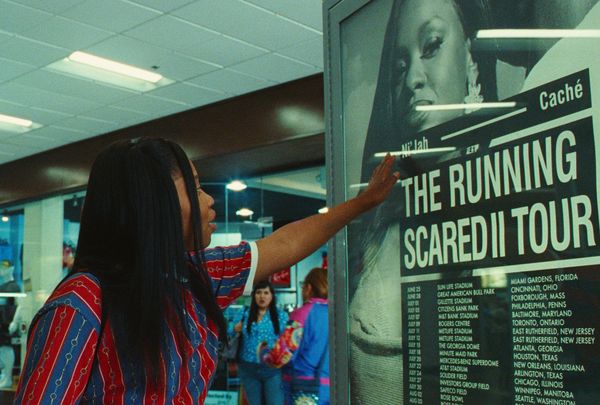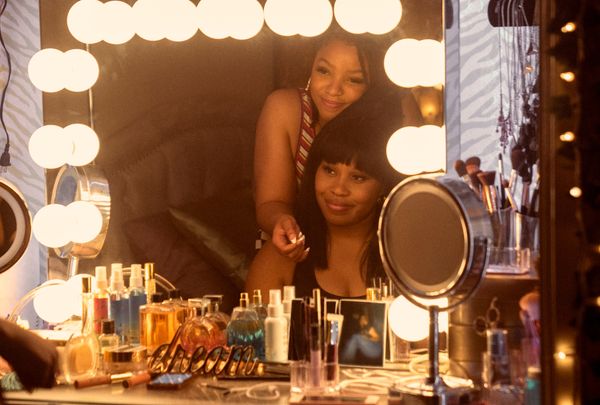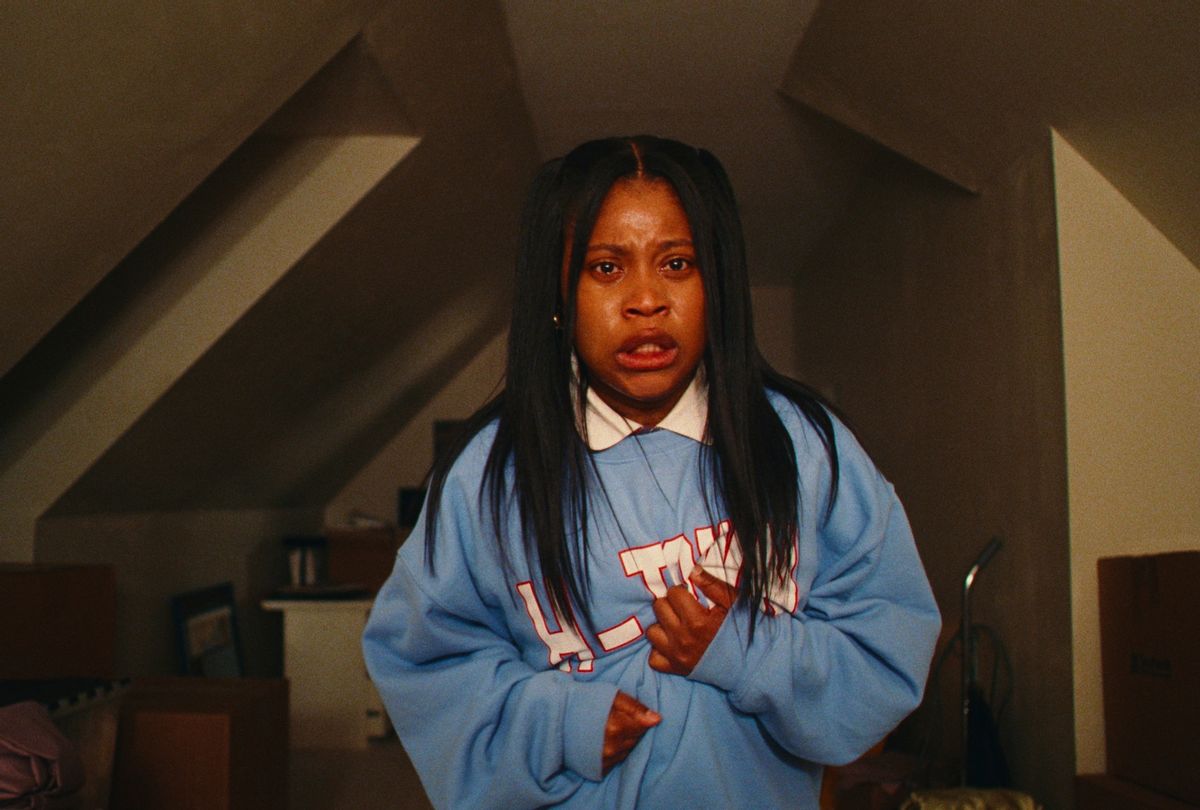Before watching "Swarm," I would have politely suggested that the compulsion to describe anything that doesn't fit neatly into a box as "a provocation" was a cop-out. To be less diplomatic, it's pretentious and a haphazardly applied catch-all popping up more frequently in recent years.
Here's a stack of receipts to prove it. Among the recent examined objects and happenings deemed provocations are Madonna's face, an all-black watch, the concept of "Rethinking Sex," "Drag Race" winner Jinx Monsoon's tour, a Russian jet colliding with a U.S. drone over the Black Sea, and Roxy Music's first album cover.
The military dustup and Monsoon's insistence on taking up space in hostile partisan territory qualify as provocations. As for the rest, a face is a face whether it's on a time-keeping device or a person. Skeletal, nearly naked supermodels on covers might have been uncommon in 1972, but in the realm of rock that counts as a tease.
Considering Merriam-Webster's definition as it applies to Donald Glover's collaboration with "Atlanta" writer Janine Nabers – which is to say, "something that provokes, arouses or stimulates"– makes me slightly less hesitant to pass judgment.
"Swarm" endeavors to be many things concurrently: horror, and true crime with music video interludes and satire piled into a showcase for Dominique Fishback's versatility. It's to her credit that the limited series has the feeling of an anthology at first since she takes on several distinct personas both as her main character, Dre, and under various aliases.
"Swarm" is chaos with a plan.
Dre is awkward and aspirational, a young woman who aims to be fashionable and current but wears her mismatched spirit on the surface like an inside-out sweater donned in the dark. Sometimes she moves and acts like a 12-year-old girl. Sometimes she behaves with stiff prudishness. In other scenes as other people, she flops about with the weird violence of a marionette playacting a vixen only to become that sex object after a blood sacrifice.
In the presence of her pop goddess Ni'Jah whether on a TV screen or in person, she's a slack-jawed, mesmerized cipher ready to be absorbed whole or devour anything in her way.
Dre is all kinds of disturbed, a manifestation of toxic fandom and narrow purview of the extremely online. Fishback ensures you can't tear your eyes away from any of her faces.
 "Swarm" (Amazon Studios)Title cards opening almost every "Swarm" episode declare, "This is not a work of fiction. Any similarity to actual persons, living or dead, or actual events, is intentional." Like a juicy urban legend, you can either believe that or not, although a series-ending statement from a legal department makes the truth plain. If you buy it.
"Swarm" (Amazon Studios)Title cards opening almost every "Swarm" episode declare, "This is not a work of fiction. Any similarity to actual persons, living or dead, or actual events, is intentional." Like a juicy urban legend, you can either believe that or not, although a series-ending statement from a legal department makes the truth plain. If you buy it.
Through these motifs, the show's creators play into our affinity for toying with reality. They claim that every crime depicted in "Swarm" is inspired by a documented case that took place between 2016 and 2018, whether it be a reported homicide or an Internet rumor that went viral. Some are familiar since Ni'Jah is the show's Beyonce analog, like a reenactment of the notorious yet still unconfirmed face-biting incident.
But "Swarm" isn't specifically kicking the Beyhive. Dre's Ni'Jah zealotry could easily refer to Nicki Minaj's Barbz army or Swifties, or anyone wrought to a frenzy by the mildest social media dis. Glover has his own experience with Internet mobs acting in his name or against him related to the audience for his FX show or his musical endeavors, recorded under the moniker Childish Gambino.
By any name, Dre's devotion is an extreme version of a type. When we meet Dre in 2016 she's willing to tumble into massive debt, stiffing her sister Marissa (Chloe Bailey) on her half of the rent for a chance to see her goddess in concert.
Then something terrible happens, and Dre responds with explosive violence. She tears off on a cross-country spree informed less by hiding from the law than running from herself but towards nothing concrete. And if "Swarm" were simply this, it would quickly skitter into a rut.
But right when its velocity skates on that edge, the narrative takes a sharp left. Eventually, it flies over a cliff, but even this is a feat since, in the end, its initial thesis survives the freefall albeit not as cleanly as another series that might have opted for a parachute. Not everyone will love the way "Swarm" ends, but the point is easy to get . . . and the delivery system, such as it is, is both glamorous and creepy.
Want a daily wrap-up of all the news and commentary Salon has to offer? Subscribe to our morning newsletter, Crash Course.
"Swarm" is chaos with a plan. It begins as something conventional and a few episodes in, transforms from a predictable sedan into a Decepticon. Those who appreciate the way Glover and Nabers treat the medium as an opportunity to blast apart convention won't be bored. Confused, probably, and a lot, but not in a way that divides your attention.
What I can't unstick from my brain is how defiant it is of simple determination. To be honest I can't say I entirely loved "Swarm," but I appreciate it enough to want to dissect and discuss it, and in the fullness of time that has more value. It's the rare series that doesn't aspire to be broadly pleasing while making its case for being carefully watched and evaluated as entertainment, societal critique and high art in one pass. It is accessible enough for anybody to get and leaves a yawning chasm for interpretation.
Glover is fond of describing his creative approach as "punk," one of those terms lacking a hard definition beyond that you know it when you see it. In "Atlanta" it manifests in surreal episodes or acts within installments operating as small independent films within broader plots. Sometimes they function as comments on the story's moral. Others interpret "independent" to mean "freestanding and entirely separate."
Such dedication to craft and experimentation can leave people cold. But it also requires the kind of confidence that makes the goal of mainstream embrace secondary to the value of the moonshot. "Swarm" isn't quite that far out on the scale between "Law & Order" and European avant-garde cinema in that its targets are as obvious as its meta-narrative winks.
 "Swarm" (Amazon Studios)
"Swarm" (Amazon Studios)
Incorrectly answering Dre's question, "Who's your favorite artist?" might lead to a trivia dump where she lists how many fewer Grammys another artist has compared to Ni'Jah, and possibly grimmer consequences besides.
The show is accessible enough for anybody to get and leaves a yawning chasm for interpretation.
Even these sequences contain smears of farce begging to be noticed alongside casting that marries purpose to stunt. Bailey, who performs as Chlöe, is a Grammy-winning singer songwriter. Placing her as Dre's best friend operates as something of a trompe l'oeil given Dre's reason for living is to picture herself in the inner circle of musical royalty. Another casting choice is brilliantly unsubtle and best left to discovery; if you want to be surprised you should probably stay off Twitter until you watch.
Yet another permits a member of pop royalty to poke at absurd designations of racial identity in the knowing way of a person who has dealt with such questions her entire life. You only comprehend that secondary layer if you immediately recognize who that person is, and not everyone will. If you don't, she's still amusing for the reasons she adores her favorite pop star.
Talking around these details is awkward, but preserving their mystery is essential since what they represent is more important than who they are. These things matter as much as the deviations to the overall arc that the writers insert within each episode, distorting the smallest details enough to instill a sense that this world is askew, casually if deliberately off-kilter.
And Nabers, the series showrunner, sets up each role to ensure their celebrity expands the meaning of what they're representing in "Swarm." One is like Dre, weaving her life around the illusion that the celebrity she stans understands her, is an extension of her thoughts, and represents who she should be. This mode of thinking is alluring, childish, sexy, frightening and recognizable.
All of it makes the nervy premise of "Swarm" qualify as . . . stimulating, arousing, and that other word we might use to describe something that makes no promises to please but rewards being seen.
All seven episodes of "Swarm" are streaming on Prime Video.



Shares